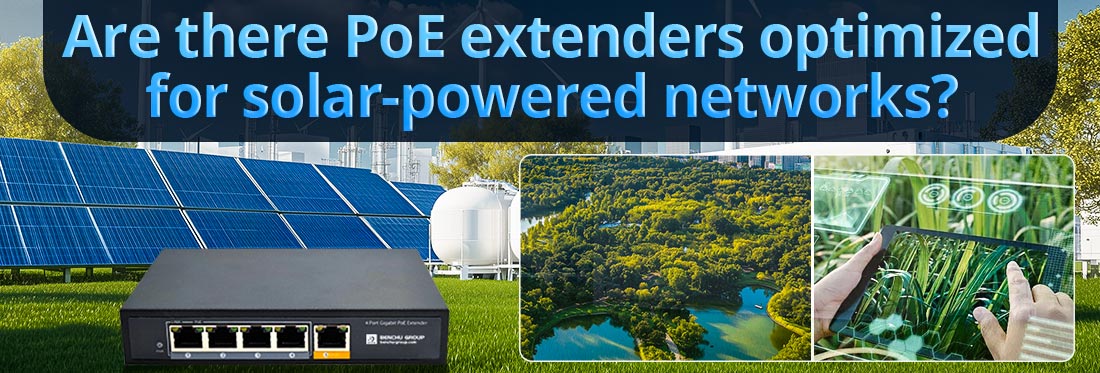
نعم، هناك موسعات PoE (الطاقة عبر الإيثرنت) مُحسّنة خصيصًا للشبكات التي تعمل بالطاقة الشمسية. تم تصميم هذه الموسعات للعمل بكفاءة في البيئات خارج الشبكة حيث يكون توفر الطاقة محدودًا أو متقطعًا، مما يجعلها مثالية للمواقع البعيدة مثل أنظمة المراقبة أو محطات الطقس أو عمليات نشر إنترنت الأشياء. فيما يلي وصف تفصيلي لميزاتها واعتباراتها:
ميزات موسعات PoE المُحسّنة للشبكات التي تعمل بالطاقة الشمسية
1. انخفاض استهلاك الطاقة
--- تعتمد الشبكات التي تعمل بالطاقة الشمسية على تخزين محدود للطاقة (مثل البطاريات). موسعات PoE تم تصميم الأجهزة المُحسّنة لمثل هذه الإعدادات للعمل بأقل استهلاك للطاقة مع الحفاظ على كفاءة نقل الطاقة والبيانات.
2. نطاق إدخال الجهد الواسع
غالبًا ما تدعم هذه الموسعات نطاقًا واسعًا لإدخال جهد التيار المستمر (على سبيل المثال، 12-48 فولت تيار مستمر) لاستيعاب إخراج الألواح الشمسية وأنظمة البطاريات. تتيح هذه المرونة التكامل السلس مع إعدادات الطاقة الشمسية.
3. كفاءة ميزانية PoE
--- تقوم بتوزيع الطاقة بكفاءة على الأجهزة المتصلة (مثل الكاميرات أو أجهزة الاستشعار أو نقاط الوصول)، مما يضمن استخدام الطاقة المتاحة بفعالية.
--- دعم معايير PoE المتقدمة، مثل 802.3af (PoE)، أو 802.3at (PoE+)، أو 802.3bt (PoE++)، يضمن التوافق مع مجموعة متنوعة من الأجهزة.
4. المتانة ومقاومة الطقس
غالبًا ما يتم تركيب الشبكات التي تعمل بالطاقة الشمسية في الهواء الطلق، مما يتطلب تمديدات تحتوي على:
--- حاويات متينة مصنوعة من مواد مقاومة للعوامل الجوية ومقاومة للتآكل.
--- تصنيفات حماية الدخول (IP) مثل IP65 أو IP67 للحماية من الغبار والماء والطقس القاسي.
--- نطاقات واسعة لدرجة حرارة التشغيل (على سبيل المثال، -40 درجة مئوية إلى +75 درجة مئوية) للاستخدام في البيئات القاسية.
5. دعم المسافات الطويلة
--- يمكن لموسعات PoE المحسنة توسيع الطاقة والبيانات حتى 100 متر (328 قدمًا) لكل وحدة وغالبًا ما تكون قابلة للتسلسل التعاقبي لزيادة النطاق دون الحاجة إلى مصادر طاقة إضافية.
6. إدارة الطاقة المتكاملة
--- تشتمل بعض الموسعات على ميزات إدارة الطاقة الذكية لتحديد أولويات الأجهزة الأساسية عندما تكون الطاقة محدودة، مما يقلل من هدر الطاقة.
7. تصميم مدمج وخفيف الوزن
--- سهل التركيب على الأعمدة أو الجدران أو الهياكل الأخرى الشائعة الاستخدام في الأجهزة التي تعمل بالطاقة الشمسية.
8. الحماية من الصواعق والصواعق
--- تضمن الحماية المدمجة الموثوقية في المواقع المعرضة للصواعق أو تقلبات الطاقة، وهو تحدٍ شائع في المنشآت التي تعمل بالطاقة الشمسية.
حالات الاستخدام لموسعات PoE التي تعمل بالطاقة الشمسية
1. أنظمة المراقبة:
--- تشغيل كاميرات IP في المناطق النائية مثل الحدائق أو الطرق السريعة أو الحدود.
2. إنترنت الأشياء والمراقبة البيئية:
--- دعم أجهزة الاستشعار والأجهزة التي تراقب الطقس أو مستويات المياه أو جودة الهواء.
3. الاتصالات:
--- توسيع الطاقة والاتصال بنقاط الوصول اللاسلكية عن بعد أو أجهزة إعادة الإرسال.
4. الزراعة الذكية:
--- تمكين الاتصال لأنظمة الري الذكية وأجهزة مراقبة المزرعة.
أفضل موسعات PoE للشبكات التي تعمل بالطاقة الشمسية
1. أنظمة تايكون TP-DCDC-1256G-VHP
الميزات الرئيسية:
--- نطاق جهد الإدخال الواسع: 10-60 فولت تيار مستمر، متوافق مع أنظمة الطاقة الشمسية.
--- يدعم 802.3at/af وPoE السلبي مع مخرج يصل إلى 70 وات.
--- تصميم مقاوم للطقس للمنشآت الخارجية.
--- حماية متكاملة من التيار الزائد والتفريغ الإلكتروستاتيكي (ESD).
--- الأفضل لـ: التطبيقات عالية الطاقة مثل كاميرات PTZ أو نقاط الوصول اللاسلكية في الأنظمة التي تعمل بالطاقة الشمسية.
2. كوكب IPOE-E174
الميزات الرئيسية:
--- يدعم 802.3bt (بو++) للأجهزة عالية الطاقة حتى 95 واط.
--- تصميم من الدرجة الصناعية بتصنيف IP67.
--- نطاق درجة حرارة التشغيل الواسع: -40 درجة مئوية إلى +75 درجة مئوية.
--- يمكن توصيله بسلسلة ديزي للوصول الممتد إلى التركيبات عن بعد.
--- الأفضل لـ: شبكات الطاقة الشمسية الصناعية التي تعمل على تشغيل أجهزة متعددة في ظروف قاسية.
3. يوبيكويتي نانو سويتش
الميزات الرئيسية:
--- استهلاك منخفض للطاقة لأجهزة الطاقة الشمسية.
--- يوفر ما يصل إلى 24 واط من مخرجات PoE عبر أربعة منافذ.
--- تصميم مدمج وخفيف الوزن.
--- سهولة التكامل مع حلول الطاقة الشمسية Ubiquiti.
--- الأفضل لـ: الشبكات الصغيرة التي تعمل بالطاقة الشمسية والمزودة بأجهزة متعددة منخفضة الطاقة.
4. تقنية فيرسا VX-1000-IT
الميزات الرئيسية:
--- متوافق مع أجهزة 802.3af/at.
--- الأمثل لسحب الطاقة المنخفضة والتوافق مع الطاقة الشمسية.
--- مبيت حاصل على تصنيف IP30 للاستخدام شبه الخارجي.
--- الأفضل لـ: أجهزة الطاقة المعتدلة في المنشآت التي تعمل بالطاقة الشمسية.
اعتبارات لموسعات PoE التي تعمل بالطاقة الشمسية
1. تحليل ميزانية الطاقة
--- حساب استهلاك الطاقة لجميع الأجهزة المتصلة للتأكد من قدرة النظام الشمسي على استدامة الشبكة خلال ساعات الذروة وغير الذروة لضوء الشمس.
2. سعة البطارية
--- تأكد من تخزين البطارية بشكل كافٍ للحفاظ على وقت تشغيل الشبكة أثناء الأيام الملبدة بالغيوم أو أثناء الليل.
3. التوافق
--- تأكد من أن موسع PoE متوافق مع خرج الجهد الكهربي لنظام الطاقة الشمسية الخاص بك ومتطلبات الطاقة للأجهزة المتصلة.
4. التنسيب والتركيب
--- قم بتركيب الموسعات في أماكن مظللة أو جيدة التهوية لمنع ارتفاع درجة الحرارة، مع ضمان مسافات الكابلات المثالية للأجهزة المتصلة.
5. قابلية التوسعة
--- اختر الموسعات التي تسمح بالتسلسل التعاقبي إذا كانت الشبكة قد تتوسع في المستقبل.
خاتمة
تم تصميم موسعات PoE المُحسّنة للشبكات التي تعمل بالطاقة الشمسية لتوفير طاقة وبيانات موثوقة في البيئات البعيدة أو خارج الشبكة. تعد الطرازات مثل Tycon Systems TP-DCDC-1256G-VHP وPlanet IPOE-E174 اختيارات ممتازة، حيث توفر استخدامًا فعالاً للطاقة، وبنية قوية، وتوافقًا مع إعدادات الطاقة الشمسية. ومن خلال اختيار موسع PoE المناسب والتخطيط لمتطلبات الطاقة والأجهزة، يمكنك ضمان شبكة مستدامة وموفرة للطاقة تعمل بالطاقة الشمسية.